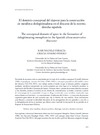Please use this identifier to cite or link to this item:
https://accedacris.ulpgc.es/jspui/handle/10553/55558
| Title: | El dominio conceptual del deporte para la construcción de metáforas deslegitimadoras en el discurso de la extrema derecha española | Other Titles: | The conceptual domain of sport in the formation of delegitimating metaphors in the Spanish ultraconservative discourse | Authors: | Díaz Peralta, Marina Piñero Piñero, María de Gracia |
UNESCO Clasification: | 5701 Lingüística aplicada | Keywords: | Metáfora Discurso político Ideología Narrativa Dominio deporte, et al |
Issue Date: | 2018 | Journal: | Estudios Filológicos | Abstract: | Starting from a theoretical framework which uses the Conceptual Metaphor Theory (Lakoff y Johnson 1980), the Narrative Paradigm (Fisher 1984, 1985) and concepts taken from Critical Discourse Analysis (Van Dijk 2011), this paper examines the way in which political discourse categorize through conceptual metaphors a complex event such as the legalization of the Spanish Communist Party, which occurred during the period of the Spanish Transition. It can be seen how the ultraconservative press, whose ideology was against the legalization, places the news within their readership’s system of knowledge, beliefs and judgments. The author achieves this using a continued metaphor whose source frame is sports, particularly football subframe, and a series of cognitive processes that generate a mini-narrative that tells the story of treason. These mechanisms contribute to the establishing of the discursive identity of the protagonists of this event and subsequently to the delegitimization of what happened as a result of the inclusion of this party in the Register of Political Associations. Partiendo de un marco teórico constituido por la teoría de la metáfora conceptual (Lakoff y Johnson 1980), el paradigma narrativo de Fisher (1984, 1985) y conceptos procedentes del análisis crítico del discurso (Van Dijk 2011), este trabajo analiza el modo en que el discurso político categoriza mediante metáforas conceptuales un hecho complejo que tuvo lugar en la transición española: la legalización del Partido Comunista de España. Veremos cómo la prensa de extrema derecha, contraria a esta decisión, enmarca la noticia en un sistema de conocimientos, actitudes, creencias y juicios de valor propio de la comunidad a la que se dirige recurriendo a una metáfora continuada cuyo marco fuente es el deporte -y, concretamente, el submarco del fútbol- y a una serie de procesos cognitivos generadores de una narrativa que teje la historia de una traición. Estos mecanismos contribuyen a construir la identidad discursiva de los protagonistas de este episodio y, con ello, a la deslegitimación de las actuaciones que dieron como resultado la inscripción de ese partido en el Registro de Asociaciones Políticas. |
URI: | https://accedacris.ulpgc.es/handle/10553/55558 | ISSN: | 0071-1713 | DOI: | 10.4067/S0071-17132018000200229 | Source: | Estudios Filológicos [ISSN 0071-1713], n. 62, p. 229-246 |
| Appears in Collections: | Artículos |
Items in accedaCRIS are protected by copyright, with all rights reserved, unless otherwise indicated.
